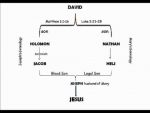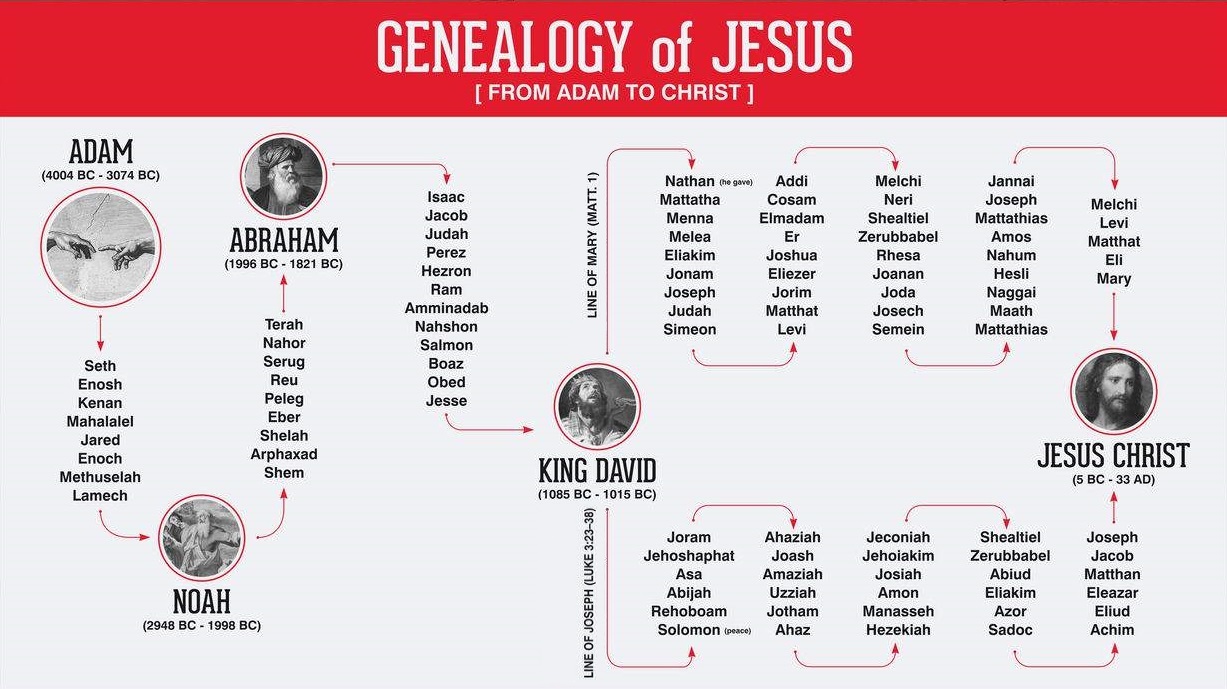Genealogy of Jesus
Luke 3:21-38
21 Now when all the people were baptized, and when Jesus also had been baptized and was praying, the heavens were opened, 22 and the Holy Spirit descended on him in bodily form, like a dove; and a voice came from heaven, “You are my beloved Son; with you I am well pleased.”
23 Jesus, when he began his ministry, was about thirty years of age, being the son (as was supposed) of Joseph, the son of Heli, 24 the son of Matthat, the son of Levi, the son of Melchi, the son of Jannai, the son of Joseph, 25 the son of Mattathias, the son of Amos, the son of Nahum, the son of Esli, the son of Naggai,26 the son of Maath, the son of Mattathias, the son of Semein, the son of Josech, the son of Joda, 27 the son of Joanan, the son of Rhesa, the son of Zerubbabel, the son of Shealtiel, the son of Neri, 28 the son of Melchi, the son of Addi, the son of Cosam, the son of Elmadam, the son of Er, 29 the son of Joshua, the son of Eliezer, the son of Jorim, the son of Matthat, the son of Levi, 30 the son of Simeon, the son of Judah, the son of Joseph, the son of Jonam, the son of Eliakim, 31 the son of Melea, the son of Menna, the son of Mattatha, the son of Nathan, the son of David, 32 the son of Jesse, the son of Obed, the son of Boaz, the son of Sala, the son of Nahshon, 33 the son of Amminadab, the son of Admin, the son of Arni, the son of Hezron, the son of Perez, the son of Judah, 34 the son of Jacob, the son of Isaac, the son of Abraham, the son of Terah, the son of Nahor, 35 the son of Serug, the son of Reu, the son of Peleg, the son of Eber, the son of Shelah, 36 the son of Cainan, the son of Arphaxad, the son of Shem, the son of Noah, the son of Lamech, 37 the son of Methuselah, the son of Enoch, the son of Jared, the son of Mahalaleel, the son of Cainan, 38 the son of Enos, the son of Seth, the son of Adam, the son of God.
Observations & Reflections
 The theophany that unfolds after/during the baptism of Jesus should have been reminiscent of the ones that occurred with Moses on the mountain. This would be a familiar idea to the Jews of the day, who were waiting for a messiah that shadowed Moses in ways. At this point Luke is leaving no doubt that Jesus was sent by the Lord and that he was divine.
The theophany that unfolds after/during the baptism of Jesus should have been reminiscent of the ones that occurred with Moses on the mountain. This would be a familiar idea to the Jews of the day, who were waiting for a messiah that shadowed Moses in ways. At this point Luke is leaving no doubt that Jesus was sent by the Lord and that he was divine.
However, the genealogy given for Jesus is a bit perplexing. It is clear that the genealogy in Matthew and Luke do not match. For starters, Luke starts from present day and works all the way back through Abraham, to Adam and Eve. Matthew starts with Abraham and works his way forward to present time. But that aside, the names are drastically different even when speaking of the same time periods.

Most evangelical traditions hold that Luke’s genealogy traces Jesus lineage back through Joseph’s line whereas Matthew traces through Mary’s line. This is more clearly reflected in the 2nd century Aramaic translation of Matthew that reads Joseph was the guardian of Mary. The actual Greek word used, which was likely the original text, was ἄνδρα. This word can simply be translated as man or husband. Thus, nothing in the text really confirms that Joseph could be the father of Mary.
Another theory is that Mary was the daughter of Heli which would make her cousin to Joseph who was the son of Jacob. Joseph, her cousin, then became her guardian/husband. Since Joseph married Mary, that would make Heli and Jacob both fathers of both Mary and Joseph, through marriage. This theory seems to reconcile how Joseph can have two different fathers but not why the lineages differ. To reconcile that, we need to combine this in-law theory with the previous theory that one genealogy was for Mary’s line and one for Joseph’s. If we believe that Heli was the father of Mary and the father-in-law of Joseph and that Jacob is the father of Joseph and the father-in-law to Mary, then tracing either of their lineages back would be acceptable.
However, no matter which lineage is being traced Jesus is still an heir of King David.
 Here we see the first public declaration from God that Jesus Christ, the Savior of the world, is here. From this point on, this passage gives us the opportunity to trace just how far back the lineage of Jesus goes. When one reads this list of names, they often skip over it because to most, it has no significance. However, these names all played a role in bringing about God’s plan for redemption.
Here we see the first public declaration from God that Jesus Christ, the Savior of the world, is here. From this point on, this passage gives us the opportunity to trace just how far back the lineage of Jesus goes. When one reads this list of names, they often skip over it because to most, it has no significance. However, these names all played a role in bringing about God’s plan for redemption.
These names represent to us all those who were told of a coming messiah and who longed to see Him come. The coming of Jesus Christ had been foretold long ago and it is amazing to see how God’s plan is now being unfolded right here in this passage. All of these names were hand chosen by God to play a role in bringing about the birth of Jesus Christ.
This passage ought to fill our hearts with encouragement because all of these names were used by God to change the world. When we are able to trace God’s throughout the course of history, it reaffirms that God has been in complete control of dictating every single step that lead up to Jesus Christ coming into this world. He is a God that has proven His faithfulness throughout the years and will continue to do so in our own lives today.
[Featured image from Bible-science guy]

I think you have the linage lines quoted wrong in the picture. The top should be Luke and the bottom Matt.
Dang I meant to change that. I already had the picture edited and just forgot to change it lol